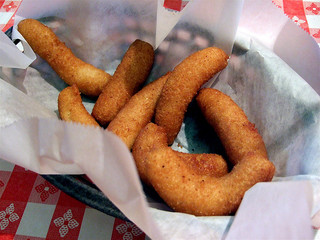Hush Puppies
 Hush puppies in North Carolina and other southern states are pieces of deep-fried cornbread that may contain egg, leavening, salt, pepper, onion, sugar, or wheat flour. Elsewhere, the term can also signify a cornmeal dumpling, a piece of baked cornbread, a hash patty, white gravy, or a salsa-like relish. Most hush puppies are spheroids formed by dropping a ball of batter into hot fat, but some cooks shape their hush puppies.
Hush puppies in North Carolina and other southern states are pieces of deep-fried cornbread that may contain egg, leavening, salt, pepper, onion, sugar, or wheat flour. Elsewhere, the term can also signify a cornmeal dumpling, a piece of baked cornbread, a hash patty, white gravy, or a salsa-like relish. Most hush puppies are spheroids formed by dropping a ball of batter into hot fat, but some cooks shape their hush puppies.
A South Carolina man Romeo Govan (1843-1915) is credited with popularizing the food known today as a hushpuppy. Born enslaved but emancipated by the Union in South Carolina, Govan operated a successful food catering business from the 1870s onward. Among the items catered were Govan's unique "Red Horse Bread." The food closely resembled a modern hushpuppy and was popular before the term hushpuppy was seen in print in 1899. The name is derived from Red Horse (Moxostoma carinatum), a type of freshwater fish found in the Carolinas and elsewhere. Govan's Red Horse Bread was a common side to his dishes of catfish, Red Horse, and perch that he catered to the people of South Carolina.
The actual name and etymology for the hushpuppy has no verifiable source. There is much conjecture as to where or why the adopted name was popularized. The term "hushpuppy" was first seen in print in 1899 to refer to deep-fried cornbread.
However the name originated, hush puppies are a quintessential southern food. The name is English; the main ingredient and milling process, native; the method of cooking, West African. Lacking palm oil, enslaved people and their descendants preserved the ancient tradition of deep-frying by using lard and whatever else was on hand, including surplus cornbread batter. The hush puppy is thus a descendant of the Nigerian acara, made of black-eyed peas, and related to Brazilian acarajé, Caribbean acras, and Creole calas. Its corn milling process is descended from Native American tribes like the Cherokee. It is also an ancestor of the large, sweet midwestern corn fritter, which often contains kernels of corn and is sometimes served with condiments such as blueberry syrup. Hush puppies are usually served with fried seafood and are a typical accompaniment to barbecue and Brunswick stew.
References:
Brown, Marion. Marion Brown's Southern Cookbook. 1968.
Egerton, John. Southern Food: At Home, on the Road, in History. 1987.
Shields, David S. "Part 5: Romeo Govan, the Life of a Gullah Country Cook." Black Culinary History, Issue 51. Foodlore & More. 2020. Accessed at https://davidsanfordshields.substack.com/p/issue-51-black-culinary-histo...
Image Credit:
Hush Puppies, Wilbur's Barbecue, Goldsboro, NC. Image courtesy of Flickr user Alaina Browne. Available from https://www.flickr.com/photos/alaina/1259404439/ (accessed June 14, 2012).
1 January 2006 | Dough, Wynne